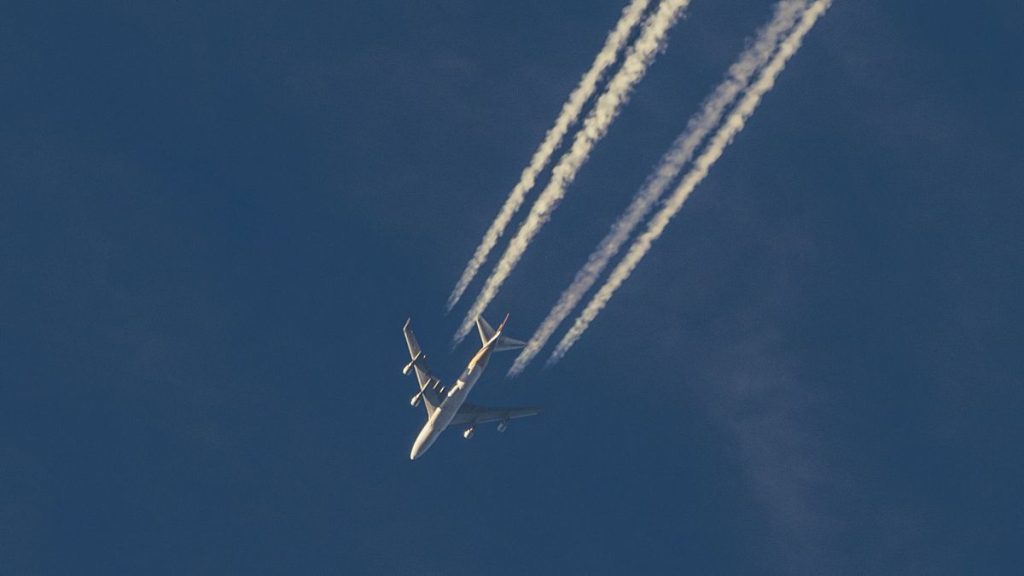The resurgence of the chemtrail conspiracy theory has found new life in a satirical news video circulating on social media platforms. The video, presented as a legitimate news report, portrays a former Lufthansa pilot suing the airline for wrongful dismissal after he allegedly refused to release chemtrails, supposedly harmful substances, over the European population. The report further claims that Lufthansa faced substantial fines from “secret world governments” for breaching contractual obligations related to chemtrail deployment. The video, often accompanied by captions asserting it as evidence of an elite conspiracy to control the public, has gained significant traction, accumulating hundreds of thousands of views and being shared across multiple languages. However, the entire narrative is a fabrication rooted in a long-debunked conspiracy theory.
The chemtrail conspiracy theory, a persistent yet unsubstantiated claim, posits that the condensation trails left by aircraft are not simply water vapor but instead contain harmful chemicals deliberately released by a shadowy “elite” to manipulate or control the population. Proponents of this theory offer varying explanations for the alleged purpose of these “chemtrails,” ranging from weather modification and psychological manipulation to population control and chemical warfare. Despite being repeatedly debunked by scientific evidence and expert analysis, the theory continues to resurface, fueled by misinformation and a general mistrust of authority. The viral video preys on these anxieties, presenting a fabricated scenario to validate pre-existing beliefs among those susceptible to conspiratorial thinking.
The origin of the deceptive video can be traced back to Der Postillon, a German satirical news website. A reverse image search of a frame from the video leads directly to the website, where the video’s watermark matches the Der Postillon logo. Furthermore, the website’s FAQ section explicitly states that all content published by Der Postillon is satirical and entirely fabricated. The website emphasizes that all characters and events depicted are fictional, despite comments suggesting that some viewers interpret the content as genuine news. This clearly establishes the video’s satirical nature, debunking the claims made within it and exposing the deceptive tactics employed to propagate the chemtrail conspiracy theory.
The enduring appeal of the chemtrail conspiracy theory, despite its factual inaccuracies, highlights the vulnerability of individuals to misinformation, especially in the age of social media. The rapid and widespread dissemination of information online, coupled with the tendency for confirmation bias and the allure of secret knowledge, creates a fertile ground for conspiracy theories to flourish. The chemtrail narrative taps into existing anxieties about government control, environmental concerns, and a perceived lack of transparency, making it easily digestible for those predisposed to distrust official explanations. The ease with which fabricated content can be presented as legitimate news further exacerbates the problem, underscoring the importance of critical thinking and media literacy.
The specific allegations made in the satirical video – a pilot fired for refusing to release chemtrails, Lufthansa penalized by secret world governments – play into the narrative of a powerful, hidden elite controlling global events. This resonates with individuals who feel disempowered or suspicious of authority figures, providing a seemingly coherent explanation for complex global phenomena. However, the lack of any credible evidence supporting these claims, coupled with the clear satirical intent of the video’s source, underscores the absurdity of the narrative. The fact that the video is taken seriously by some individuals demonstrates the power of misinformation to distort perceptions and reinforce pre-existing biases.
The spread of this satirical video as genuine news underscores the need for greater media literacy and critical thinking skills in the digital age. The ease with which fabricated content can be shared and amplified online necessitates a more discerning approach to information consumption. Fact-checking, verifying sources, and understanding the difference between satire and legitimate news are crucial skills for navigating the complex information landscape of the internet. The chemtrail conspiracy theory serves as a potent reminder of the dangers of misinformation and the importance of critical evaluation in separating fact from fiction.

